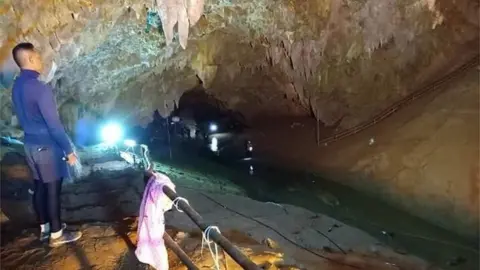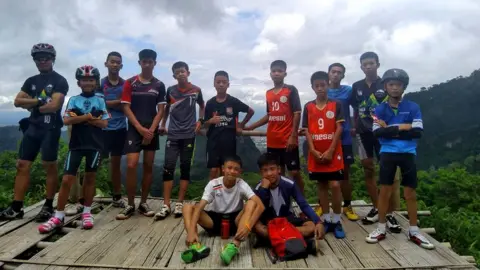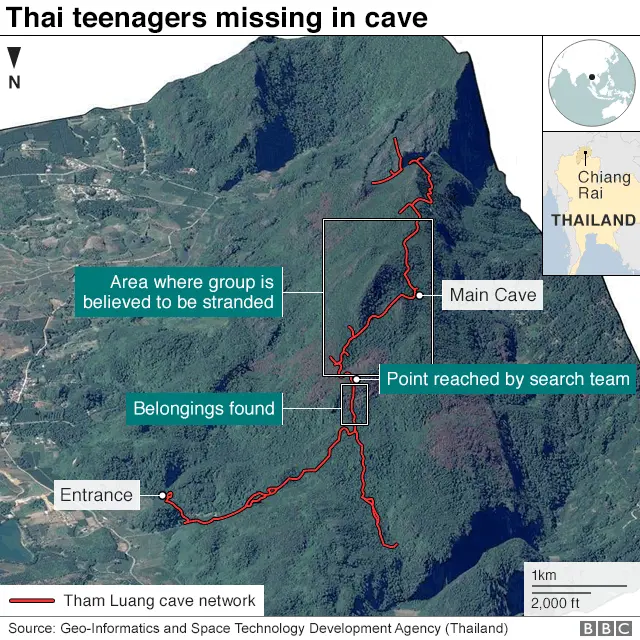Thai cave: Rising water stops divers searching for missing boys
 BBC
BBCRising water levels have interrupted efforts to find 12 teenagers and their football coach trapped in a cave in northern Thailand.
Pumping was halted and with the entrance flooded, Thai navy divers had to stop their search.
The boys aged 11 to 16 and their 25-year-old coach entered the cave on Saturday and there has been no contact with them since.
The rescue operation is now focusing on finding another way into the cave.
Thai authorities said they planned to drill a narrow shaft into the mountain to create an alternative entry point.
Allow X content?

Experts think there is a good chance the limestone cave does have other entrances. Spotting those in the vast forest-covered mountainside is extremely difficult though.
It is not known, however, where in the cave the group are trapped nor even whether they are still alive.
Messages the children sent before setting off to explore the cave on Saturday suggest they had taken torches and some food.
 Facebook/ekatol
Facebook/ekatolWhat are their survival chances?
Caving experts have told the BBC that as long as they are in a chamber above flood levels, they have a chance of survival.
The biggest dangers for the children would be hypothermia or lack of oxygen.
Cave temperatures are believed to be between 20C and 25C (68F to 77F) which is still relatively warm. Unless their clothes are wet, the temperatures are not thought to be a problem.
The porous lime stone means there should be enough oxygen although some caves in the region are known to contain bad air pockets with carbon dioxide.
Tham Luang, Thailand's fourth longest cave, is known to be prone to flooding during the rainy season.
The teenagers and coach are believed to have been cut off from the entrance by rising floodwaters.
Rescue teams and volunteers have over the past days frantically tried to find a way into the cave, scouring the surrounding area for holes, but have failed to get through.

Strained faces and limited progress
By Jonathan Head, South East Asia correspondent, BBC News
The mud-caked car park which serves as a base for the search operation is more orderly now; vehicles are restricted, journalists must register for passes, and infrastructure is constantly being improved - new phone lines, power lines, and new pipes for pumping water out of the cave.
But this only highlights how long this search is taking, and how limited the progress has been, with strain showing in the hitherto stoical faces of the families who have kept up their vigil for the 12 boys and their coach.
We saw the first US military personnel bustled in and then out of the headquarters today - they are saying little about their role or capabilities.
Two top British cave divers went into the main entrance to see if they could get further than the Thai navy divers, who have made little headway so far.
Two other British cavers climbed the steep forested slopes on the other side of the mountain, and found a promising hole above a point they have explored inside the caves in the past; but it must still be probed by climbers with ropes. And even if they do find a way in, no-one knows if the trapped boys are in that part of the cave complex.

'The most horrific experience'
Joshua Morris runs caving and climbing tours in northern Thailand and has two of his team assisting the rescue operations. He told the BBC there still is a chance the boys are alive.
"What flooded is a narrow passage about 2km (1.4 miles) into the cave. If the kids are on the other side of that, they might be in a higher chamber which is still dry," he explains.
"Being trapped in a cave like this is probably one of the most horrific things one could experience," he says. Usually, a team would have a lot of lights as well as food and water. It is unlikely the boys were at all prepared to spend more than a few hours in the cave.
Even if they are found alive, the problem will be how to get them out of there. Strong rains during the summer mean a long stretch of the passage might well remain continuously flooded for months.
"Diving in a cave like this is very dangerous.," says Mr Morris. "The water is moving, it's muddy and there is almost no visibility. That means the children - if found alive - might have to be supplied for longer time until the water can be brought back down."
On Wednesday, three British cave divers arrived in the city of Chiang Rai along with some US military personnel, to help the efforts. They are expected to go into the cave once the main entrance is accessible again.
"Water is the biggest challenge," Sgt Kresada Wanaphum in the Thai army told Reuters.
"There is a lot of debris and sand that gets stuck while pumping."


As the search efforts enter their fifth day, Interior Minister Anupong Paojinda said officials were "confident the children are still alive".
"They have food, they are skilful, we are confident they are safe."
